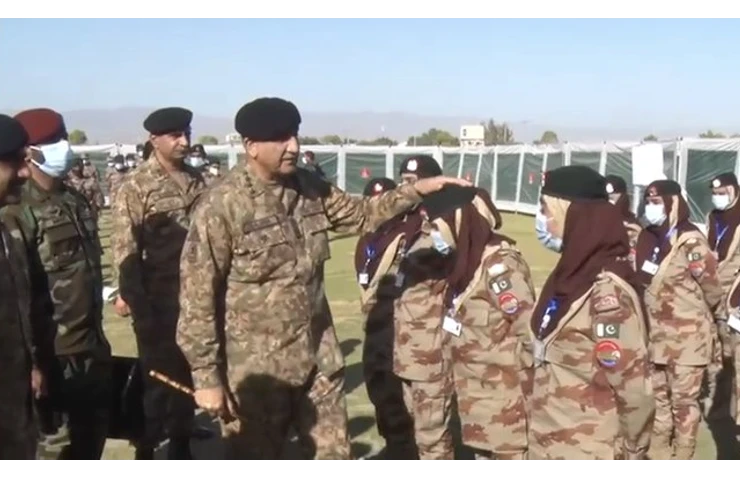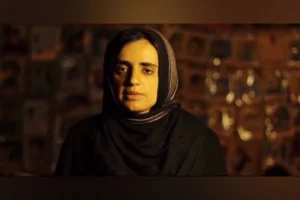Pakistani army chief General Qamar Javed Bajwa visited Kech in Balochistan where Baloch fighters had killed at least 10 soldiers last week. He also took stock of Pakistan border areas where the army is facing attacks by Taliban and protests by others against border fencing.
A press release by the Inter-Services Public Relations (ISPR)—the public relations unit of the Pakistani military, said that Gen. Bajwa was briefed on the security situation in the area, the status of Pakistan-Iran border fencing and measures being taken to counter the Baloch insurgency, reports the Dawn newspaper.
Pakistan Army Chief visited Kech (where 10 troops were martyred in terrorist attack at Sibdan Top) and met the deployed troops. Paying tribute to courage and resolve of shuhada, Gen Bajwa said that terrorists shall be brought to justice & blood of the martyrs will not be in vain pic.twitter.com/N5uQrkgtCI
— Sana Jamal (@Sana_Jamal) January 29, 2022
The army chief spent a day with the soldiers bolstering their confidence. Gen Bajwa said that the army would assist the provincial government in achieving peace and prosperity in conflict-torn Balochistan—a region that is sparsely populated, highly underdeveloped with a raging nationalist movement.
The attack on the Kech check post in Balochistan near the Iran border has shaken the Pakistani government. Local media reports have suggested that the attackers have links to Iran. At least ten soldiers were killed in a daring attack by Baloch nationalists who set fire to the check post and took away the weapons of the slain soldiers.
Two days later, bomb blasts in Dera Bugti killed four people including three military personnel.
Social media reports say that the attacks have spread fear among Pakistani troops, many of who reportedly fled their check posts.
After the successful attack of Balochistan Liberation Front (BLF) in Ketch Dasht-e-Sabdan in the last few days, a large number of Pakistani troops managed to escape by leaving check posts in many areas of Dasht last night. pic.twitter.com/2dww7xJVCC
— 𝐒𝐚𝐧𝐠𝐚𝐭𝐡 𝐁𝐚𝐥𝐨𝐜𝐡 (@sangath_baloch) January 29, 2022
Meanwhile, Pakistan's Information Minister Fawad Chaudhry vowed on Saturday that the State would avenge the killings of the soldiers. Chaudhry said: "We have retaliated before and will fully take action again and not one drop of blood of our children will be wasted. Bodies of young soldiers were felled here," for which there would be a reckoning, he said.
The minister blamed "foreign hand" behind the violence in Balochistan, adding that both kinds of violence—religious and separatist—was present in the region.
Local media organisation Baloch Warna said in a tweet that Pakistan has intensified operations in Balochistan by calling military helicopters against Baloch groups, who have recently increased their attacks on Pakistani assets.
#Balochistan: Pakistan military has started fresh offensives Kahaan region of district Kohlu. Three military helicopters have flown from Sibbi and dropped forces in Nisao, Peer-e-Dar and Koh-e-deeg areas. Currently the ground forces are trying climb up to Koh-eDeeg (Mount Deeg).
— Balochwarna News (@BaluchWarna) January 29, 2022
Commenting on the situation in Balochistan, Geopolitical analyst and Pakistan watcher, Mark Kinra told India Narrative that General Bajwa’s visit to the Kech attack site shows his contradictory statements. “On one hand he talks about taking action and fencing of the Iran-Pak border and in the same breath he talks about ushering in peace and prosperity in Balochistan. This contradicts the Baloch point of view as prosperity by way of colonialism has always been detested by Baloch Nationalists since the creation of Pakistan”, says Kinra.
He points out that different parts of the Pakistani establishment are not on the same page in dealing with Baloch nationalism.
“According to various reports, military operations have already been started in Kohlu district, but the Balochistan Chief Minister has asked Baloch nationalists to show mercy. This clearly shows Pakistan doesn’t have a plan to deal with Baloch nationalists. After waves of insurgency and killing of Nawab Akbar Bugti, the Baloch seem to have propped up with more force. No operations seem to deter them’, says Kinra.
He also says that the Kech attack has brought out the worst in the Pakistani public. “The Pakistani people including media persons like Farazana Shah say that it is "time to flatten the mountains in Balochistan’. But no journalist dared ask the question as to why Balochistan is still burning”, says Kinra.


















